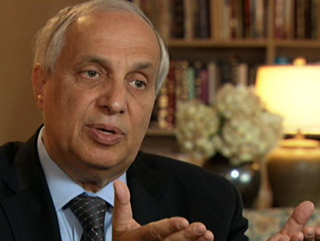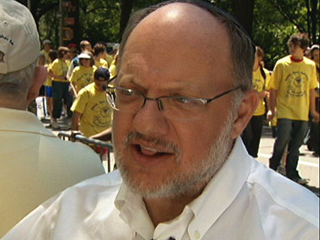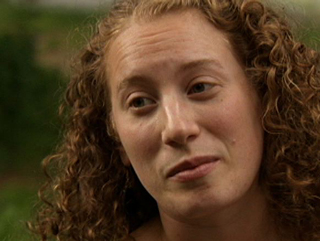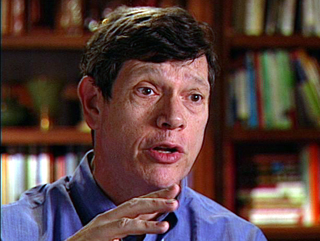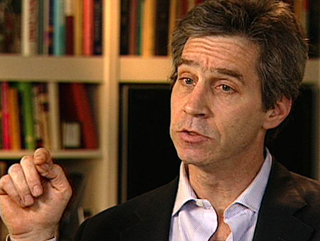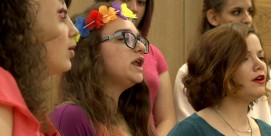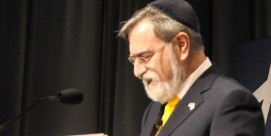In This Episode << SLIDE LEFT TO SEE ADDITIONAL SEGMENTS
Extended Interviews: American Jews and Israel
Read more of the Religion & Ethics NewsWeekly interviews about American Jews and Israel:
Rabbi Avi Weiss, Hebrew Institute of Riverdale, New York:
America is my home. I’m grateful to the US forever and ever. Israel is my homeland and that’s where my family lives, literally and figuratively. When I think about existentially who I am I think of Israel. My roots, I’m grounded, my ancestry all there.
The biblical narrative, and even if one doesn’t buy into the biblical narrative, the history of the Jewish people is wed to the land of Israel. The Bible talks about a special mission that the Jewish people has, and whenever it talks about the covenant which is our contract with God, it talks about children, people, and land, and from the very beginning that land is defined as the land of Israel. That’s where Abraham and Sarah walked.
As wonderful as I feel in America, in Israel I feel like I’m spiritually flying. I can’t explain it. It’s like asking someone why they are in love.
When you love something there could be different opinions, and I think those different opinions aren’t a bad thing. I think it’s a good thing. I think a consensus is being reached, and we are at a point now where there is an interdependence within the Jewish community. Israel is not going to make it with the political right alone or the political left. It’s not going to make it with the religious alone or those who couldn’t care less about religion. It’s only going to make it with the both, and there has to be a sense of interdependence between the two.
The political right has to understand that it has no monopoly on loving the land of Israel. The left loves the land just as much, but it thinks you’ve got to give away land for the sake of peace. The left has to understand that it has no monopoly on wanting peace. The right wants peace just as much. If both sides would stop impugning each others motives then that unity, interdependence, will be able to allow us to move forward.
Blessed be the nation that has as its army the Israeli defense forces, not only a strong army but, I believe, one of the most moral armies on the face of this earth. I know the families of the soldiers who fought house to house in Jenin at a great price, because when we went into Jenin back a couple of years, Israel could have taken out Jenin from the air but wanted to minimize loss of civilian life. Look, I mourn the loss of innocent Palestinian life. I mourn that. It’s a Jewish concept. But one must talk about intentionality. The intention of the Israeli defense forces to limit civilian losses, it’s only to target military who, unfortunately, they hide themselves amongst the civilian population. The intention of the other side: to murder as many men, women and children as possible. Are there aberrations? Of course, but it’s not part of the mainstream. It’s not part of the very system which Israel is about. Unfortunately, on the other side terrorism is very much a part of their whole motif.
I feel for Palestinians. The fault lies with Palestinian leadership. It lies with Hamas. It lies with Hezbollah. This is not a Ghandi-Martin Luther King movement. If the rockets stop lobbing into Sderot, if they are going to stop the terrorism Israel is the first one to want peace. Unfortunately, the more Israel has given, the weaker Israel is perceived from the other side, and the more the other side wants.
All I can say that whenever we have withdrawn up to this point, it has precipitated the other side wanting more. We withdrew from Lebanon and what happened was suddenly the rockets came in. We withdrew from Gush Kativ, from Gaza, the rockets came into Sderot, and I have great fears if we are going to withdraw from the West Bank, from Samaria and Judea, then Tel Aviv is right there in the line. And I think America has to understand that Israel today is the frontline against the spread of terror. I think this is one of the most important debates. Some people think that Israel’s war on terrorism is kind of isolated to the Middle East. I say no. Israel’s war against terrorism is America’s war against terrorism. I believe with all my heart when an Israeli soldier falls fighting terror, he is not only fallen in the defense of Israel and the Jewish people, he has fallen in the defense of the West, of the free world.
Israel is alone and Israel needs as much support as possible, and so it’s critical that there ought to be support not only from Jews, but from non-Jews as well. But as much as American Jewry helps Israel and as much as America helps Israel, I think it’s reciprocal. I think Israel is America’s greatest friend in the Middle East. I think today Israel really stands strong, being the bulwark against the spread of terror as it was the bulwark against communism during the cold war era.
I see the grassroots as being front and center and being in absolute solidarity with the people of Israel. There are of course those who would criticize, but by and large the support is overwhelming, and what I would do is, I think, it’s important for American Jews to visit Israel. I think it’s important for them to live in Sderot. If you live amongst those wonderful people you will see how peace-loving they are. I take second place to no one when it comes to an understanding the spirituality and potential holiness of all people, including Palestinians. I desperately want to live in peace with Palestinians. Rabin used to say you have to make peace with your enemy. You can only make peace with an enemy who wants to make peace with you. Having Gaza which is controlled by Hamas, by terrorists, or withdrawing from the West Bank, which could then be taken over by Hamas or Hezbollah— that is not good for Israel, and it’s not good for America.
I walk the length and the breadth of Israel. I don’t only see Israel being involved in a political kind of equation. I see Israel as a place of spirituality. I see it as an extraordinary place where people reach out for the vulnerable. I see a medical system; I see a social service system. Yes, I see Jews and Arabs in many, many places doing everything they can to find a language to talk peacefully and embrace each other. I see it as an extraordinary light, as Isaiah would say, to the nations of the world.
I take second place to none of those critics when it comes to concern for the Palestinians. Where we part company is where you place blame. They are placing blame on the state of Israel, on the army. I place the blame squarely on the heads of Hamas, and I will say it clearly. I would say to the Palestinians, if they had a Martin Luther King, nonviolent disobedient movement, they would have had a state many years ago. But when you’ve got a movement where you go bomb buses and you go into restaurants lobbing rockets and you maintain that it can be justified—nothing justifies terror.
We have to find some kind of way of making peace with the Palestinians, which I believe the settlers desperately want, while allowing people who have lived in these places to continue doing so. I can only tell you this: If from the other side there would be a show of trust in real peace rather than terrorism, the history of Israel is that Israel made peace with every Arab country who wanted to make peace with Israel. I believe it’s very fair for there to be natural growth [of the settlements]. Imagine someone turning to an American family saying you can’t have more children, or if you have more children you can’t add a home. What I find very difficult is when America and an American administration starts bullying Israel and starts pushing Israel around. Israel is a sovereign state, and I believe Israel knows best what is in its best security interest. From my perspective Israel knows more about security-wise in the Middle East than America knows. It’s got the experts, it is on the ground, and in that sense it makes an extraordinary contribution to America as well.
I think the mission [of Israel] is to be in a place where one has sovereignty and autonomy and can develop a society that really cares for the oppressed and for the vulnerable. It does so in its own place, in its own land, and does its share to set an example for others. That’s the Israel that I know. That’s the Israel that I love. That mission, I think, is ultimately going to evolve with people of all political persuasions and all religious backgrounds.
In the rabbinic literature Israel is compared to a dove. A dove can’t fly with one wing. You need both wings, and they may have disparate ideas, but there’s got to be a blending together and a consensus and a coming together. I think that’s the most critical challenge Israel faces today.
Rabbi Michael Paley, scholar-in-residence and director of the Jewish Resource Center of the UJA-Federation of New York:
I stand with Israel, and I love Israel. I love the Jewish people, and I love Israel. It’s been one of the most important aspects of my whole life. I came of age at 1967, and it fired my identity. But Israel has to make a choice: a democratic state, a Jewish state…and my particular flavor is a Jewish democratic state with territorial compromise. This does not take away my love for Israel or my hope for its security.
Because I love Israel, because I stand with Israel, I believe and hope and pray in its destiny. I believe its destiny is probably better within or closer to the 1967 borders. I’m not critical of Israel; it’s a democratic state. I don’t want to take away the rights of the voters who live there, like my brother, or my nephew who is in the Army now, are people who live and vote in Israel.
The 20th century for Jews was a difficult century, and we had to, for morality reasons, take power, and power is more difficult. We haven’t been very good at it. We haven’t had to decide the fate, as a Jewish people, of other people who are not Jews. We haven’t been in control of even the Jewish faith. We are in control of other people and sometimes we’ve been too aggressive, sometimes we haven’t listened to their rights, sometimes we’ve blotted out their voices. Sometimes they made us blot out their voices. Sometimes our trauma of the last century comes out and bites us and we say, “oh, what, are you crazy, you are not going to have any compromise at all? You know what happened the last time.” Of course, I’m conflicted. I don’t like to see these things. But still I stand with Israel. That’s the unique contribution of the Jewish people right now, and it’s a place in which our destiny is going to be wrapped up. It comes from our deep history, and it will also be our future. I hope we can do it with vision and understanding, even prophetic wisdom.
Abby Bellows, Jewish activist and community organizer:
I grew up in the Havurah movement. It was founded in the early ’70s as a breakaway from the Conservative movement and the Reconstructionist movement. It was people who wanted a more vibrant, more social justice-oriented Judaism. There were rabbis who were part of the movement but weren’t presiding over it. I grew up in one of the original Havurot in DC, Fabrengen. I’m involved in a lot of independent minyanim in New York—independent prayer communities. My Judaism has always been kind of free-form.
I feel complex in my feelings towards Israel. My grandmother escaped from Germany. A lot of our family was killed there. I get the need for a Jewish state from that kind of visceral level, and I recognize that anti-Semitism still exists in the world, but at the same time I feel that there is something fundamentally tense for me about having a state that by definition gives preference to one group over another, because my Jewish values taught me about egalitarianism, and I feel like they are not being represented necessarily in the policies of Israel.
The lack of Palestinians being able to get permits for building homes easily or the challenges with civil rights for a lot of Arab Israelis, Bedouin Israelis. Those things really concern me. The way that the Orthodox community is privileged over other types of Jews in Israel is really concerning to me and in a lot of ways I feel doesn’t reflect the Jewish values that I have been taught.
A lot of my friends are into progressive Israel activism. They are post-Zionist or they are progressive Zionist. They find some way with organizations like the New Israel Fund, J Street—organizations that are trying to better Israel with a progressive bent. But I have a lot of other friends who just feel really alienated from the state. I’m a community organizer, and a lot of left-Jews really don’t connect or are embarrassed by Israel or feel really alienated.
For a lot of people in my generation, we are struggling to understand the connection to Israel, the relevancy of it. For a lot of us anti-Semitism isn’t a daily reality, although the attempted attacks in Riverdale brought it close to home for a lot of us in New York. We still question how our values are reflected in the world, given Israel. For a lot of us what comes up more often than not, people in my circle at least, is friends of our who are on the left saying disparaging things about Israel or saying things that are particularly critical. I think a lot of people my age aren’t equipped to respond in a way that’s not just total right-wing-they-can-do-no-wrong, and I think that the path to fighting anti-Semitism is not only about drawing inward and protecting the Jewish state. It’s about educating and building relationships with people who are different than us. It’s painful for me to see Israel activists who are only in the paradigm that my grandmother told me: “Jews need to care for the Jews.” That’s not the interpretation that I’ve taken from the Holocaust and from the history of persecution of our people. Yes, we need to have a fall-back position of protection. What’s really going to change our future is building relationships that are interfaith, intercultural, and reflect the best of Jewish tradition, which is about being questioning and critical and open-minded.
For me it’s about the treatment of Palestinians. It’s also about the treatment of Bedouins, the Arabs who have become Israeli citizens. It’s also about Jews who aren’t Orthodox in Israel. I have friends who have made aliyah and had to do an Orthodox conversion, when previously they were very strong, practicing Conservative Jews.
I think Israel has to be much more upfront about human rights as a first, bottom-line priority, and that is something we can be proud of because Jews believe in human rights.
The most recent time I went, last summer, I went for my cousin’s wedding, who made aliyah. It was a feeling of home culturally. I love the feeling of walking down a street that’s called Hillel and the feeling of integration, of having the words that I use to pray be the words I hear on the street. The last trip I was on was a narrow trip. My vision was within my family and my friends, and it was pretty easy to not see what was happening in the West Bank, at the checkpoints, at other sites of contestation in Israel.
My Judaism has always been fully expressed in this country. I have never been raised with a Judaism that is referential to Israel necessarily, and when I was the president of Hillel I remembered having a conversation with the other leaders about taking down a sign in the entry way of Hillel that said “Wherever we stand, we stand with Israel,” which was Hillel’s motto, because it turned off a lot of my friends who didn’t feel comfortable coming into the space. I always try as a Jewish leader to create a Judaism that doesn’t have to be about Israel for the sake of the continuity of our people, celebration of all the richness of our heritage. I think right now for young Jews, it’s really important to have a Judaism that can be a Jewish home where people can feel comfortable even if they don’t put out their credentials about their support of Israel.
Professor Steven Cohen, Hebrew Union College:
In 1948, the State of Israel is born and American Jewish involvement with Zionist and other organizations is at its peak; it will never be as high as it is then. It plummets in 1949 and kind of putters along. There is a blip in 1956 with the Sinai campaign and still Israel is not a major part of the American Jewish consciousness until 1967. In 1967, we have the Six Day War. American Jews are mobilized and because they are coming out and becoming full-fledged Americans and proud Jews and ethnic Jews Israel will play a major role in their consciousness from ’67 probably through the 1980s. And since the 1980s there has been a declining American Jewish interest in Israel, in large part because of changes in the identity of American Jews. They are becoming more personal, less collective, more religious, and less ethnic, and Israel is a very unusual symbol for a religio-ethnic group in America. American Jews regard it as their homeland, but hardly any have ever lived there. Israel is their quasi-national symbol. They love the country. It represents ethnicity, nationality, culture, pride, heart, soul to the vast majority of American Jews.
In part, [American Jews] are reacting to Israel as a response to the Holocaust. For years, Jews have suffered from persecution. That persecution never reached the height that it did in the destruction of 6 million Jews in Europe. A fragment of those Jews joined other Jews who had been in the land of Palestine, then Israel. Before that Israel is born as a result of a Zionist movement and the return of Jews to Israel and American Jews are very aware of that narrative from ashes to the glorious, miraculous state of Israel, and that really cements the American Jewish relationship with Israel starting with 1948.
Both Jews on the left and Jews on the right want to blame Israeli politics for the alienation of some American Jews from Israel. The right says the left is too critical of Israel, the left says Israel deserves to be criticized. If it had better policies, it would hold the attention of American Jews.
The real engine of declining American Jewish interest in Israel is changes in American Jewish identity, the way American Jews think of themselves as Jews, and in particular intermarriage. The more Jews marry non-Jews, the more they adopt a definition of being Jewish which is very much like American Protestant Christianity, and American Protestant Christianity is spiritual. It’s about faith, it’s about religion, and there isn’t an automatic place for a national homeland.
On measure after measure, older people outscore middle-aged people, middle-aged people outscored younger people. Older people are more attached to Israel than younger people. Why is that? In large part, younger people are more likely to marry non-Jews, and it’s the result of that marriage, that their attachment to Israel is lower than older people. Among non-Orthodox Jews, most young Jews marry non-Jews. Were we to only look at the in-married, we would find that in-married Jews today are as if not more attached to Israel than in-married Jews of yesterday.
The Orthodox is a growing segment of American Jews. Eight percent of Jews my age, I’m in my 50s, twenty-three percent of American Jewish children are being raised in Orthodox Jewish homes. They are the China of American Jewish life, the growing force. Orthodox Jews, as opposed to everybody else, have become more attached to Israel. More travel to Israel, more study in Israel, more settlement in Israel. It may be that one-fourth of American Jewish Orthodox people will move to Israel in their lifetime. That is an amazing number, and it reflects the deep commitment of Orthodox Jews to the land, state, and people of Israel.
Orthodox Jews will come to exercise even more influence over the ways of which American Jews relate to Israel politically, culturally, religiously and in other ways. They are more conservative, some say hawkish, about Israel’s conflict with its Arab neighbors, and their approach to Middle East politics will come to more and more influence the way American Jews relate to that part of the world.
Left of center American Jews—and let’s remember Jews are the most left of center group in America—left of center American Jews are adopting more dovish stances towards the conflict, pretty much in keeping with the current American administration’s approach to the conflict. They want a two-state solution to the conflict, Palestinian state alongside a Jewish state. They want peaceful negotiations, and they want the withdrawal of settlements from the West Bank.
We have more left-of-center Jews than Orthodox Jews, but we have more Orthodox Jews who are deeply involved with Israel. Most Jews see themselves as progressive, liberal, left-of-center sorts of people. Israel is very unpopular in the American left, and in fact the world left. The same principles which make the non-Jewish left unhappy with Israel make the Jewish left uncomfortable with Israel. So they are attached to Israel as a family matter, but they are unhappy with this member of the family, and they somehow would like this member of the family to behave a little better.
American Jews who would like Israel not to be there are a very small number. They get a lot of attention from the press, they get a lot of attention from American Jews, but when we go to the surveys we find very few Jews are in opposition to the Jewish state of Israel. The vast majority like the fact there is a Jewish state in Israel. They care about Israel; they care about the Jews who are there.
Israeli officials recognize that America is Israel’s primary strategic ally, and in that equation American Jews play a vital role. If American Jews don’t support Israel, then America won’t support Israel, and Israel will stand alone in the world against all of its enemies. Most Israelis think that way.
One of the problems that highly engaged Jewish young people have is that right now they have a choice either to be advocates for Israel or to be apathetic, and by creating other ways and other spaces in which Jews can be pro-Israel these people can be engaged with Israel and still, like many Israelis, take issue with particular policies of the Israeli government.
I have long been what we call a Labor Zionist. I believe in partition, the 1947 resolution that divided the land of Israel into an Arab state and a Jewish state. I would like to see a return to partition, a Palestinian state and a secure democratic Jewish state of Israel, and I think the way to get there is through serious negotiations with our Palestinian counterparts and a strong American and European presence in those negotiations and guarantees for the state of Israel. Without security, I am not willing to countenance significant withdrawals. But I believe that withdrawals from the West Bank will enhance Israeli security in the long run.
From our surveys we know that American Jews are widely concerned about the Iranian threat to Israel and to world peace as well. They, like our leaders, are unclear about what is the appropriate response, what will work to prevent Iran from becoming a serious nuclear threat to world peace and to the very survival of Israel.
America is an exceptional country. It has made Jews different from Jews everywhere else in the world, including Canada, Argentina, the UK, France. American Jews have adopted a more religious, faith-oriented definition about what it means to be Jewish. Jews in those other countries are still more cultural, more national, more ethnic, and therefore, in certain senses, more patriotic about their connection to Israel.
I’m very concerned about changes in American Jewish identity. The lack of interest in Israel among Jewish young people is important in and of itself, and important for what it says about changing Jewish identity. I’m a Jew who happens to believe that Jews need to be fully Jewish, religiously and ethnically Jewish. I’m very concerned that the ethnic aspect of being Jewish is in decline.
If secular Jews are angry at Israel for the way their way of being Jewish is being treated, by definition they are Israel-engaged. My concern is with secular Jews who don’t even know that secular Jews in Israel from their point of view are getting a raw deal.
No one is more critical of Israel than Israelis. Criticism of Israel indicates engagement with Israel. American Jews should be worried when their children stop criticizing Israel.
Philip Weiss, writer and blogger:
I didn’t have much of a relationship with Israel until after the Iraq war. Close friends of my family moved there when I was young, but it didn’t really interest me, and it was only after the Iraq war when I really began to look at my country’s relationship with Israel. My best friend told me, “oh they just destroyed the air force in Egypt and Syria on June 5th, 1967, and I was somewhat indifferent to that, I confess. I was 12 years old; it just did not mean that much to me. My family were secularized, academic Jews and they were tempted—because they thought anti-Semitism was an important factor in American life, a belief I don’t share with them—they certainly thought about moving to Israel. But I think the importance of opportunity for their children in the US came before that.
Israel is pursuing disastrous policies on its own that, as a Jew, I have to stand up and say this goes against all my training as an American, this goes against the civil rights struggle in which I took a part, this goes against the Vietnam War struggle in which I took a part, so I’m going to stand up as a Jew, a proud Jew, and denounce these policies and say you have to find a new path—the Jim Crow policies in the West Bank, the 600-700 checkpoints, the destruction of all hope for Palestinians for one-and-a half million Palestinians under occupation, for the Palestinians who were blockaded in Gaza, this sort of contempt for Palestinian human rights for certainly the last 40 years. It’s not just Jewish in my view. I come to this as a very proudly identified Jew. I grew up, that was my whole identity of being Jewish, and I developed a more diverse, American Jewish identity. As I became an adult I intermarried, I broke Jewish law in that respect. I don’t keep a kosher household, so there are many ways in which I represent sort of a typical kind of integrating Jew. I’m not very religious. I’m certainly not an observant Jew and I’m—no other religion calls to me. I go to synagogue a couple of times a year. I define myself as a Jew because apart from the fact that my mother and father are Jews, that I was raised Jewish and I feel Jewish all the time, I would say the ways in which I’m Jewish are that I’m a very bookish person. Books and reading are very important to me. I think of myself as Jewish because I bring a kind of an intellectual sensitivity to issues that I think is very Jewish. This sort of universal tradition in Jewish life of “rachmanes,” concern for others, is something that is part of me.
There is a little bit of love. I think about that often, because I criticize Israel night and day. I spend a lot of time criticizing Israel, just as I think I would have been criticizing the American South when it was segregated in the 1960s, I would have been criticizing it night and day. I would have been a Freedom Rider. The things that I love about Israel, and I’ve only spent a week there, but the things that I love, and I study the place, I think that journalism is wonderful journalism. Right now, the best journalism in the world is coming out of Israel. You have very brave Jews who are exploring things in a very open way. I think that intellectual tradition that I associate with Jewish life is very alive in Israel. When I’ve walked in Jerusalem, when I walked in small towns on my one visit, it was very pretty and beautiful.
I have been frequently been accused of being disloyal, and I think it is—I don’t care about that. I think that I’m being very loyal. I respect the power of communities to define themselves, and so in the 1600s the Jewish community in Amsterdam defined itself in such a way that Spinoza was outside. He was excommunicated, he was considered disloyal, and I respect that religious communities can do that, and today the religious community and the Jewish leadership of the US is trying to exercise a monolithic orthodoxy. In some ways it is reminiscent of the Soviet Union in terms of its tolerance of heretical ideas. What are my heretical ideas? They are that one man-one vote, all men are created equal. These are values I was given by Abraham Lincoln, by the civil rights struggle, by my American experience. So I think they have Jewish roots, too. I actually feel very strongly that I am trying to help my people. I feel a real, as assimilated as I am in many ways, I feel a great loyalty to the Jewish people, and I think the leadership, especially when it exercises these loyalty oaths or any prohibition on open discussion on this is making a very bad call. And so I assert myself as a Jew, and I say Jews have to talk about these things.
What I think is intolerable is a state that is oppressing a minority to the degree the Jewish state is doing so now. So I think Israel is facing a choice right now, that the two-state solution which Obama is pushing is truly its last opportunity to save the Jewish state, and if it fails, if it fails to take the two-state solution, it’s going to be involved in governing a majority population of Arabs in a Jewish state.
A million Jews have left Israel. They are living in Europe, they are living in the US. They don’t want to live there, and these are largely secular Jews, and they are Jews like me, who seek opportunity in a diverse society that respects minority rights. So I think Israel, which has taken a very sharp turn to the right under Netanyahu and Avigdor “Loyalty Oath” Lieberman, Israel faces a choice what kind of society it wants to be. I think it should grab the two-state solution.
Israel should learn from its Jewish cousins in the US that minority rights are essential, and diversity is essential, and these things make Jews safe.
You will notice Netanyahu has not said one word against the settlements. There is now a move to close down outposts. He can’t say he’s going to close down settlements because his coalition falls apart, and those settlements include these people of a fanatical religious character.
Take down the checkpoints in the West Bank is the first thing they should do. I think they should start taking down the wall, I think they should lift the blockade on needles and cloth and everything else that can’t get into Gaza.
I am obviously a minority and a very distinct minority. I represent a fringe of American Jewish life and yet the concern of the American Jewish leadership in the US is the concern that my fringe is getting bigger by the moment, and it is getting bigger because of the Gaza slaughter which woke up a lot of American Jews, thinking what kind of society is this? By the election of Avigdor Lieberman, of Netanyahu. There are many demographic changes that are going on in American Jewish life that is giving me more and more company by the day.
The tradition that I cherish in Judaism is respect for man in God’s image, the words “bitzalem,” which the human rights organization in Israel has, that God created man in his own image. That means all men, and so that kind of respect for all human beings, regardless of their ethnicity, I see as Jewish and is it true that many Jews do not accept my definition? Absolutely, but do we also understand in America that identity is fluid? Yes. I think that I represent a strain in Judaism. If Judaism is going to survive as a sort of a meaningful, moral presence, which I want it to be, then it’s going to have to embrace my views, and it’s why I have so much company now.
Under 35, 60 percent of American Jews are doing what I’m doing. They are intermarrying. They are fully enjoying their minority freedoms in the US, and I think many of them do not see Israel as sort of necessary. Israel came out of a movement that responded to horrific conditions for Jews in Europe. This is something that I think everyone has to remember, that I have to bear in mind whenever I’m criticizing Israel. If it were 100 years ago, I think I would have been a Zionist. If I were living in Vienna or Berlin, which is what I would have been doing, trying to be a journalist in the early 20th century, I would have been a Zionist, because there was a glass ceiling for Jews and worse, there were programs that my ancestors fled in Russia. Those are all real conditions that Zionism came out of. It’s why it captured the Jewish people, and those conditions don’t exist anymore and that is why summoning the Holocaust, which is what the Jewish leadership is reduced to again and again in order to maintain support for Israel in the American Jewish population—that has run its course. And for Jews under 35, I think their attitudes are going to be much more detached about Israel, and that’s the big threat the special relationship faces.

